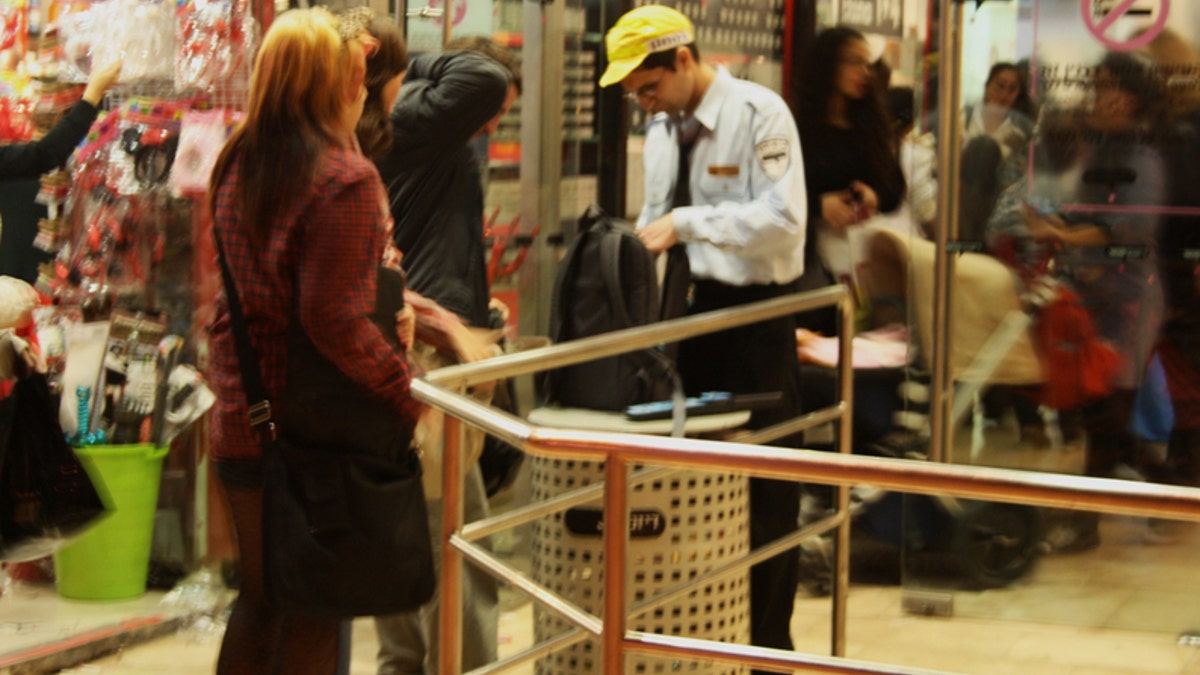
Israeli border police search a Palestinian, next to newly placed concrete blocks in an east Jerusalem neighborhood, last month. (AP Photo/Oded Balilty)
HAIFA, Israel – As the grip of terror tightens on Europe, a blueprint for existing with an unrelenting threat lies to the east, where Israelis have become accustomed to metal detectors, armed guards, spot searches and long lines.
No nation has faced more security challenges in the face of unrelenting terrorism than Israel, and now the Jewish state's methods could light the way for Europe now that much of the continent finds itself awash in refugees and under threats from ISIS. But emulating Israel will not be cheap or convenient, and can never completely eliminate the risk of an attack -- anytime and anywhere.
"Israel has the determination [to secure its citizens] but it is also a question of financial considerations, too," Efraim Inbar, professor of political studies at Bar-Ilan University in Tel Aviv, told FoxNews.com. "They put a lot of money into the security services. We have guards checking shoppers, passengers. It's a big system. Some people might find it offensive in terms of living in a democracy, but this is what is needed."
Rifle-toting guards at shopping malls and train stations, compulsory ID cards and a host of other highly visible security measures are all part of daily life in Israel. Not as readily apparent is a well-resourced internal and external intelligence community with tentacles everywhere. The extensive security apparatus comes at a significant cost in high taxes, but Israelis see it as the only alternative in the face of a daily threat from Islamic extremism, a threat with which the West is increasingly coming to grips.
"Some people might find it offensive in terms of living in a democracy, but this is what is needed."
"If the West continues to delude itself about the scale of the challenge, those who delight in the divine gift of life will find themselves becoming increasingly constrained and terrified by those who assert an imperative to kill and be killed in the name of God," David Horovitz noted in Sunday's Times of Israel.
Parisians are still reeling from Friday's coordinated attacks, which killed at least 129 and followed the Charlie Hebdo attack in January. With a wave of hundreds of thousands of refugees pouring into European cities from the war-ravaged Middle East, international law enforcement experts fear ISIS may have planted terror cells among the desperate masses. The terror organization has already said it would do exactly that.

Israelis were also once reluctant to submit to searches and encounter metal detectors at malls and government buildings, but in the face of an unrelenting terror threat, such inconveniences have become part of life. (AP)
While Western nations and constitutional democracies value freedom and individual rights above all else, Israel learned the hard way that compromises must be made to keep people safe. The target of numerous radical Islamic militant organizations -- including ISIS and Hamas -- as well as states sponsoring terrorism, such as Iran, the Jewish state changed its mindset after suffering a wave of Palestinian suicide bombings during the late-1990s and early 2000s that cost many hundreds of lives – among them dozens of U.S. citizens – and maimed many more.
It is currently experiencing, but containing, a sustained wave of terror attacks emanating mainly from Palestinians incited by radical Islamists. There have been a series of cases in the past few weeks where terrorist attackers have been "neutralized" by members of the public, as well as those in which police, the army, or security services reacted fast to eliminate terrorists involved in random attempts to kill innocent citizens. The cost of defending Israel -- from both foreign and internal enemies -- is staggering. By the most modest estimates, Israel spends a whopping 5.2 percent of its gross domestic product on defense, some 50 percent more per capita than the U.S., according to the World Bank.
Nations such as France, the United Kingdom and Germany typically spend 2 percent or less of GDP on defense, a number that could soar if Israeli-style measures are deemed necessary to guard against terror.
"I am not sure that Europe is ripe for it, and I am not sure they have the political determination to change," Inbar said. "There is no foolproof system though, and Europeans (as well as Americans) have to learn to live with this [terror] phenomenon. Israel is not always successful in preventing terrorism. This is part of life in these times."
Strict security and proportionately high expenditure on defense and internal security are things Israelis earnestly wish they could live without, but painful experience has meant having to change. Many in Europe and beyond still seem reluctant to make those changes, fearing the erosion of some civil liberties -- despite the heavy loss of life in Paris last weekend -- and the prospect, according to many experts, of more terrorist attacks to come on mainland Europe.
"I think the experience of our security services is very valuable and many do come and learn from us in terms of defending installations, including airports," Inbar said. "The basic change however has to come in terms of the public atmosphere, what should be done about this, and this is something the Europeans have to do on their own."
